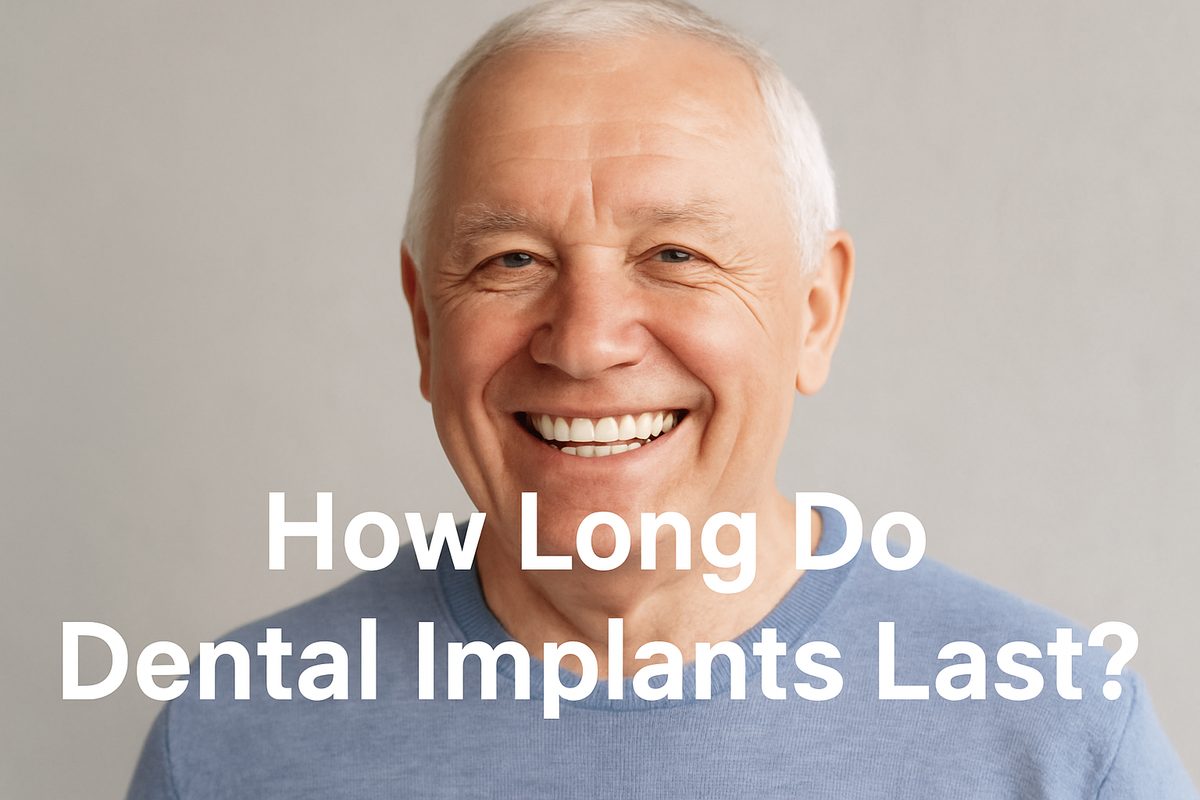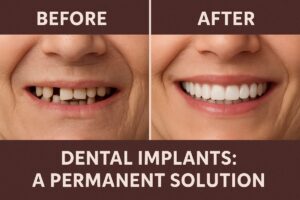If you want to know how long to dental implants last in Fort Wayne and Auburn, IN, the short answer is: most implants last many years — often 10–30+ years and sometimes a lifetime. Lifespan varies by patient, implant type, bone health, daily care, and habits. This post explains typical ranges, what studies show, the main factors that affect longevity, warning signs of failure, and practical steps to protect your investment.
Average Lifespan: How Long To Dental Implants Last
Dental implants commonly last between 10 and 30+ years. “Success” usually means the implant stays stable, pain-free, and supports a healthy crown or denture without major bone loss or infection. Many patients keep implants for life when risk factors are controlled and regular care is maintained.
What Studies Say About Implant Longevity
Large clinical studies show high short-term success and gradually lower survival over decades. Typical findings:
- 5-year survival: about 95–98%
- 10-year survival: about 90–95%
- 20-year survival: often 80–90% depending on study and patient mix
These numbers reflect modern implant systems and careful patient selection. Long-term success improves with good oral hygiene and regular dental follow-up.
Main Factors That Determine Implant Lifespan
Implant material and design
Titanium implants are the most common and have decades of successful data. Zirconia implants are metal-free and may suit some patients but have less long-term data. Implant shape, surface treatment, and the connection between implant and abutment also affect stability and bone health.
Bone quality and location in the mouth
Dense jaw bone (usually in the front of the lower jaw) offers better support than softer bone (often in the back of the upper jaw). Implants in high-load areas or in poor bone may need bone grafting or special planning to last longer.
Oral hygiene and maintenance
Daily brushing and flossing around implants and regular professional cleanings lower the risk of peri-implantitis (infection around the implant) — a leading cause of failure.
Systemic health and habits
Smoking, poorly controlled diabetes, osteoporosis, and some medications increase risk. Managing chronic conditions and quitting smoking improves long-term outcomes.
Teeth grinding and bite forces
Bruxism (grinding) and heavy bite forces can damage implants or the crown. A nightguard or bite adjustment can protect implants and extend their lifespan.
Signs an Implant May Be Failing
Watch for these red flags and see your dentist promptly:
- New or persistent pain around the implant
- Looseness or any mobility of the implant or crown
- Swelling, pus, or gum redness that won’t go away
- Bone loss visible on X-rays or a sinking feeling
How To Maximize How Long Your Dental Implants Last
- Brush twice daily and floss or use interdental cleaners around implants.
- See your dentist for checkups and professional cleanings every 3–6 months as recommended.
- Wear a nightguard if you grind your teeth.
- Quit smoking and control health issues like diabetes.
- Follow your dentist’s instructions for diet and healing after surgery.
When Implants Need Repair Or Replacement
Many problems are repairable without removing the implant. Common fixes include replacing a worn crown, tightening or changing an abutment, and treating infection with cleaning and medication. If an implant has lost too much bone or is mobile, removal and bone grafting followed by reimplantation may be needed. Timelines vary, but reimplanting often requires months for grafting and healing before a new implant can be placed.
Choosing the Right Provider
Experience, proper diagnostics, and consistent follow-up care matter most. Ask prospective dentists about their implant training, success rates, and how they handle complications. Sedation & Implant Dentistry in Fort Wayne and Auburn, IN, has offered implant care since 1995 and uses advanced diagnostics and sedation options to make treatment predictable and comfortable. Dr. David Painter maintains advanced implant credentials and a long track record of cases in the region.
Quick FAQ
Will implants last a lifetime? Some implants do last a lifetime, but that depends on bone health, care, and habits.
Do implants need special care? Yes — routine brushing, interdental cleaning, and regular dental visits are essential.
Can everyone get implants? Most adults can, but factors like bone volume, smoking, and uncontrolled health conditions may require extra treatment or make implants unsuitable.
If you’re worried about implant lifespan or thinking about implants, book an exam to review your options and get personalized planning. Call Sedation & Implant Dentistry to discuss next steps and a care plan tailored to your needs.






